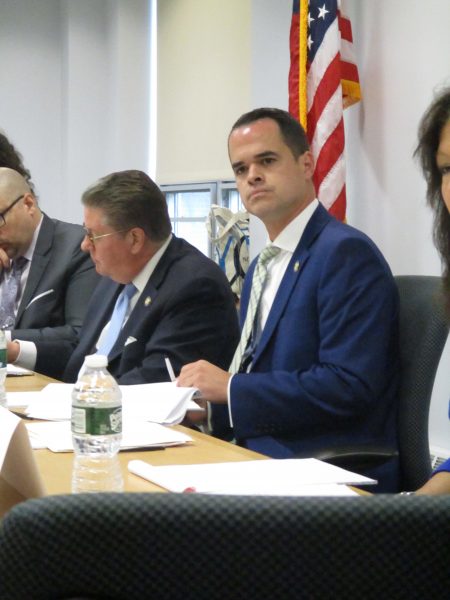Officials, Experts Brainstorm on Curbing Opioid Abuse at Hearing

Officials and mental health experts called on the state last week to provide additional funding for mental health and opioid abuse programs and give counties and municipalities greater flexibility in how those funds are spent.
Discussions on these topics were held during the daylong Hudson Valley hearing on opioid and substance abuse and mental health issues on Oct. 3 at the Putnam County Training and Operations Center in Carmel. The hearing was conducted by the Joint Senate Task Force on Opioids, Addiction and Overdose Prevention, co-chaired by state senators Peter Harckham (D-Lewisboro), David Carlucci (D-Clarkstown) and Gustavo Rivera (D-Bronx).
Last week’s forum was one of seven hearings that the task force is holding throughout the state. The group will compile a report on suggestions to curb the growing problems connected to opioid and substance abuse and mental health and submit it to the state legislature early next year.
The morning session was a roundtable discussion featuring officials from throughout the region. State Sen. Sue Serino (R-Hyde Park) said substance abuse and mental health were personal for her; she lost her brother to suicide, and drugs were believed to be the cause of death.
Serino, whose brother was bullied as a child, said more mental health services must be made available for young children.
“Our kids are crying for it,” she said.
Michael Orth, commissioner of the Westchester County Department of Community Mental Health, said Westchester “is trying to create a true system of care,” which is a top priority for County Executive George Latimer. Deaths resulting from opioid abuse have risen significantly in Westchester, Orth said. In 2010, there were 27 opioid deaths; in 2016 that number rose to 126.
Every year Westchester conducts a forum attended by 400 high school students who return to their respective schools to provide their peers with information on substance abuse and how to get help, Orth said.
Furthermore, when state grants expire, it is difficult for his department to plan for services, he said. One initiative Orth hopes to develop is a comprehensive crisis services plan to deal with substance abuse and mental health issues in Westchester.
Jacqueline Johnson, deputy commissioner of the Dutchess County Department of Behavioral and Community Health, was among those who told state senators that local governments should be allowed more flexibility in how they can use state funds.
Harckham said he agreed with a suggestion from some of the speakers that the public needs somewhere that they can call for help with substance abuse and mental health issues.
The afternoon was devoted to a public hearing. Ashley Brody, CEO of the Valhalla-based Search for Change, a nonprofit organization that works in the mental health community, said state government needs to ensure that changes in Medicaid that are placing more individuals in managed care do not diminish the care and treatments for people with mental health issues.
Susan Salomone, an executive board member of the Westchester-based Drug Crisis in Our Backyard organization, provided several suggestions to the task force. She pressed for requiring that anyone who has survived a drug overdose stay in a substance abuse treatment facility for at least three days, opening more community outreach centers for those who abuse drugs, and providing more peer recovery programs for substance abusers.
